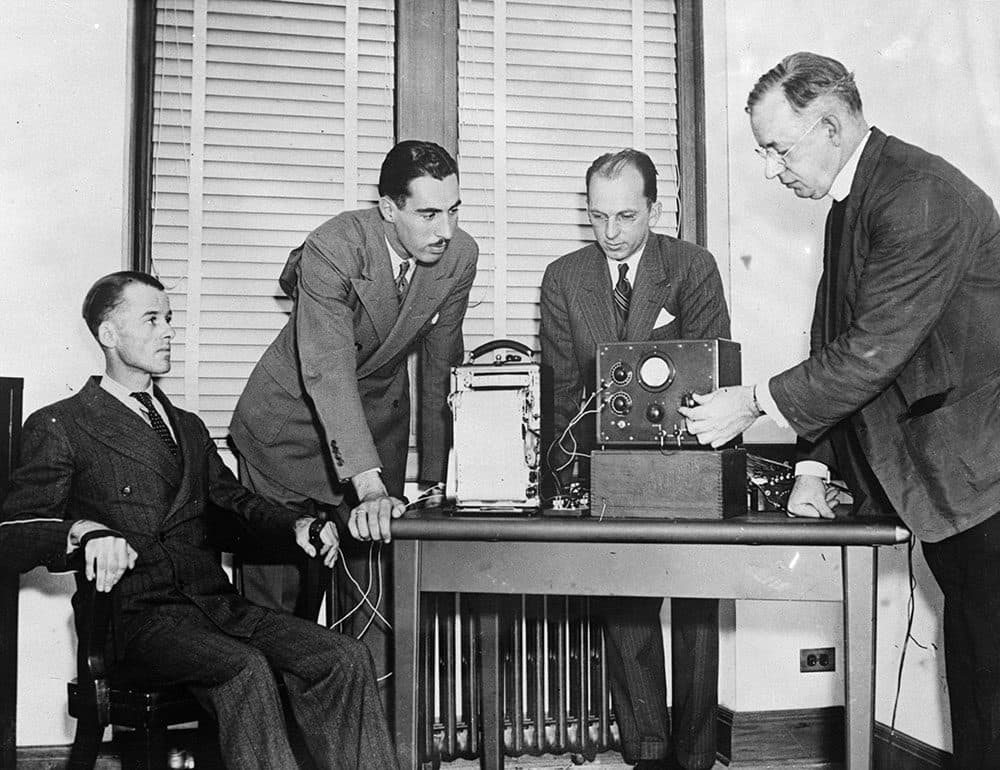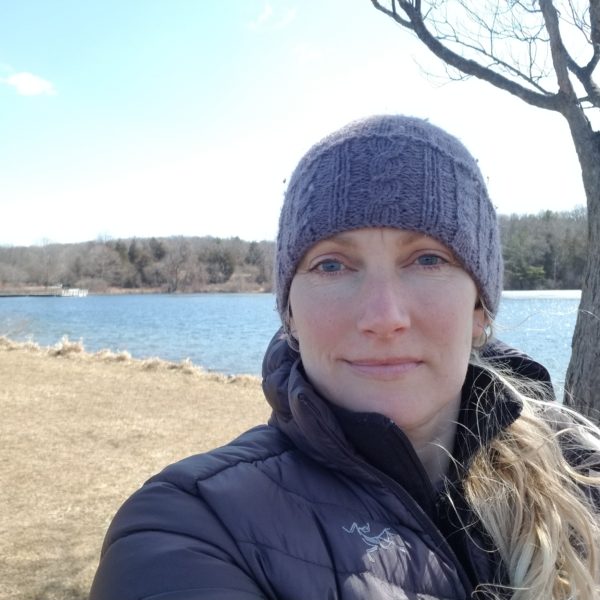Advertisement
In Search Of Truth
Part II: The Science Behind How We Perceive Truth

This series is produced in collaboration with The Conversation.
In the second installment of our series on truth, we dive into the science behind truth. How do we define it, how do our brains process it and why do we fight over it?
Guests
Jay Van Bavel, associate professor of psychology and neural science at NYU. Director of the Social Identity and Morality Lab. (@jayvanbavel)
Adrian Bardon, professor of philosophy at Wake Forest University. Author of "The Truth About Denial: Bias and Self-Deception in Science, Politics and Religion." (@bardon_adrian)
Interview Highlights
What are the different parts of the brain that are important to understand when it comes to our processing of truth?
Jay Van Bavel: “The first thing that's important is thinking about sensation. So humans have five senses: vision, touch, taste, smell and hearing. And depending on what we're presented with, it affects the sensory cortices associated with that type of scent. So right now, people are listening to us. They're hearing the information come in through their ears. It's being sent as electrical signals in their auditory cortex. And then they're trying to make a sense — often through visualization, and memory and other parts of the brain — to understand the concepts that we're discussing on the radio right now.
"… So that's the first phase. So most of sensation is how we experience the world, as long as our senses are intact. The next stage — and this is where truth can be debated far more — is at perception. That we might hear something. But you and I might have different interpretations of what we heard. So this came out with a lot of great illusions. One of the most recent ones that went viral was ‘Laurel vs. Yanny.’ I'm not sure if you heard that one, but the same sound is interpreted differently by different people. And so somehow the sensation is working, but the perceptions are far off.”
When the brain is processing something that’s true — for example, I have a cup of tea next to me — what does it look like in my brain when I process that truth?
Jay Van Bavel: “A lot of things are happening in your brain. So if you're looking at the tea, that information goes in through your eyes to the back of your brain, to the visual cortex. And you start to represent the size of the cup, the colors and maybe how much tea is in it. You might start to have a sensation of how warm it is, if you actually reach out and put your hand on it, or if you can see steam coming off. You start to get representations in your motor cortex that help guide you to reach out.
"So you can grasp it, and then bring it up and drink it. And then that hits your tongue. And your tongue has different ways of sensing — whether it's sweet, or bitter or sour — as you drink it. And so that hit a number of sensations, just that one cup of tea. And then all of them are getting integrated in your mind to determine, did you like it? Because you've to determine: Did it look good? Did it smell good? Did it taste good? Did it have a good aftertaste?
"So all of those things are getting integrated and that's affecting your memory. And you might decide, ‘I don't want to buy that type of tea next time I go to the local cafe.’ Or, ‘I might want to.’ It might be the best tea you’ve ever had. And so all of these different brain regions are working together to build that understanding of whether you like the tea or not. But it just starts at the most basic level of what you're seeing, and tasting and smelling.”
Why it is sometimes hard for the brain to process the difference between something true or something fake
Jay Van Bavel: “Our brain often starts with the assumption that what we're sensing is reality, in part because we need to have a layout of what's around us to survive. You know, I'm in Manhattan. If I can't see a car coming down the street and I walk out in the road, I would be dead instantly. So that's not a very adaptive way for the brain to work. So for the most part, the senses that we have are pretty accurate and can tell us, you know, what's in our environment, where to sit down, whether we're interacting with another person. And it does a good job of that, which is why we're able to live as long as we do and, you know, make it to our work today. But there are moments where it breaks down or gets confused — where the expectations are working differently, or it's attached to something that we really value. Like I read a headline in the news that's really upsetting and I don't want to believe it. And so that's often from later things that kick online and help us interpret reality that can lead us to reject true things or believe false things.”
Are we more likely to believe things that are told to us from members of our social groups?
Jay Van Bavel: “Yeah, that's the people that pass on the information that we trust. And you have to think in the modern world, there's so many issues that we can't possibly know. So for personal experience here, I tried to read up on climate change, by reading the original scientific articles. And I have a PhD, I’m a professor, and I couldn't understand it. So I have to trust the institution of science, and the peer review process and the other experts working on it — who've gone through rigorous training — to get a sense of what the reality is in that topic. Other than, you know, going back to school for five more years myself to try to understand it. And so we place a lot of trust in institutions and people around us. And that's really the only way to wrap our mind around so many complex issues that are going on in the world today.”
From The Reading List
NYU Press: "Why Our Brains Love Fake News — and How We Can Resist It" — "Counselor to the President Kellyanne Conway touched a nerve—to put it mildly—when she coined the phrase 'alternative facts' in a January 2017 interview defending Press Secretary Sean Spicer’s false claim that President Donald Trump’s inauguration had drawn record attendance in Washington D.C. Spicer’s boast was easily disproven through photographs that showed that the crowd on the mall for Trump’s inauguration was about a third the size of the one at President Barack Obama’s inauguration in 2009.
"So how could Conway—and some Trump supporters at large—cling to a different version of reality? Political opponents have long held different opinions, critics argued, but those have always been based on differing analyses of the same facts. If now the two sides couldn’t even agree on the facts, what hope was there for genuine debate?
"Many journalists labeled the phrase 'Orwellian' and lamented it as emblematic of a new era in which voters’ political convictions shaped which kinds of evidence they’d accept, rather than the other way around. And since then, amid mounting evidence that the deliberate creation of social media-friendly “fake news” may have shaped the outcome of the 2016 election (an article falsely claiming that Pope Francis had endorsed Donald Trump received close to a million engagements on Facebook, for example), the conviction among many that something is uniquely and newly broken in American politics has only strengthened.
The Conversation: "Humans are hardwired to dismiss facts that don't fit their worldview" — "Something is rotten in the state of American political life. The U.S. (among other nations) is increasingly characterized by highly polarized, informationally insulated ideological communities occupying their own factual universes.
"Within the conservative political blogosphere, global warming is either a hoax or so uncertain as to be unworthy of response. Within other geographic or online communities, vaccines, fluoridated water and genetically modified foods are known to be dangerous. Right-wing media outlets paint a detailed picture of how Donald Trump is the victim of a fabricated conspiracy.
"None of that is correct, though. The reality of human-caused global warming is settled science. The alleged link between vaccines and autism has been debunked as conclusively as anything in the history of epidemiology. It’s easy to find authoritative refutations of Donald Trump’s self-exculpatory claims regarding Ukraine and many other issues.
"Yet many well-educated people sincerely deny evidence-based conclusions on these matters. In theory, resolving factual disputes should be relatively easy: Just present evidence of a strong expert consensus. This approach succeeds most of the time, when the issue is, say, the atomic weight of hydrogen.
"But things don’t work that way when the scientific consensus presents a picture that threatens someone’s ideological worldview. In practice, it turns out that one’s political, religious or ethnic identity quite effectively predicts one’s willingness to accept expertise on any given politicized issue."
TIME: "Why Can't People Agree on Basic Facts" — "Your brain is programmed to get a kick out of information. This makes our current digital era a celebration for your mind. While the agricultural age gave us easier access to nutrition, and the industrial age dramatically increased our quality of life, no other era has provided so much stimulation for our brains as the information age. It is as if, finally, our brain has succeeded in building its own amusement park that is perfectly customized for itself.
"... It would seem that the digital revolution should come in handy when trying to alter people’s minds. If people love information, what better way to influence their beliefs than to offer data? Yet, a puzzling phenomenon emerged with the rise of the digital age. As information about the world became readily accessible, people were still inclined to argue about the facts. For example, despite photographic documentation of the 2017 presidential inauguration, many disagree about the number of people who attended the event; and in the face of a publicly available birth certificate of the 44th President of the United States, there are diverse opinions regarding his birthplace.
"When debating, our instinct is to burst in with ammunition in the form of facts and figures that support our view. But what actually determines whether someone will be persuaded by our argument or whether we will be ignored?"
This program aired on February 25, 2020.

